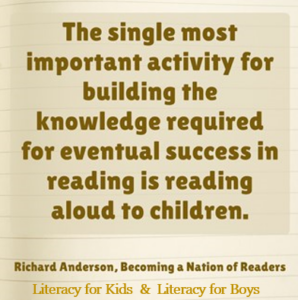Read Aloud to Boost Comprehension

Research proves conclusively that one simple activity — reading aloud to children — is the best way to prepare them for learning to read and to keep them reading as they grow.
Whether you’re a new teacher seeking guidance, a seasoned pro looking for fresh ideas or a parent, let’s look at the value of reading aloud ~ we think it’s really valuable from Pre-K through to Year 8. There are countless benefits to read-alouds and yet, with the crowded curriculum, focus on data and now “catching up” after Covid, this is a practice that is increasingly disappearing from timetables. Here are 6 key reasons for reading aloud to our students.

1) Prevent the ‘Decline at Nine’
Have you heard of this term? This research term comes from studies that show that reading aloud at home and at school tends to decline around the age of nine. So, around Year 3 or Year 4, parents and teachers think Read Alouds can seem baby-ish or that kids can read on their own, so there’s no need for them.
It’s around this time that reading frequency among children begins to drop!
2) Increases Student Comprehension
Comprehension isn’t just a product of answering a series of questions. It’s a process that the students are doing in their minds to make meaning and construct meaning from the text. So reading aloud can provide extra instructional time in the process of comprehension.
Also, when the teacher (or parent) models fluency and expression while reading aloud, the students begin to see how those words are pronounced and used in context, and therefore, increases their comprehension.
Parents at home ~ does your child struggle with comprehension? Asking your child to read aloud to you (and together) means that you can check on their understanding of the text. Are they ignoring punctuation marks and racing through the text? This is a common mistake and greatly affects how they interpret what they are reading! It’s advice that I regularly give parents ~ ensure that your child is aware of punctuation when reading.

3) Creates Motivation to Read Themselves
It’s important for students to see that reading can be a fun and exciting experience. Boys particularly can be hard to get over the ‘reading line’. Pick something of high interest to your students or something that connects with a topic of study. Relevance is the key to success when it comes to generating interest and promoting the positive aspects of reading. Reading aloud can lead to interest in a series by that author, books on the same topic etc
4) Improved Vocabulary
I’m so passionate about this! Reading aloud to students has the potential to broaden individual student vocabularies, which can lead to more accurate forms of written and verbal expression. With the decline in reading books, we are seeing a decline in writing standards. We must give students a chance to learn new words in context that they can then incorporate into their background knowledge for use during future reading and writing tasks.
5) Gives students access to books that are outside their independent reading level
“According to experts, it is a reasonable assertion that reading and listening skills begin to converge at about eighth grade. Until then, kids usually listen on a higher level than they read. Therefore, children can hear and understand stories that are more complicated and more interesting than what they could read on their own.”
(Trelease & Giorgis, 2019)
Read-alouds are a great leveler. When decoding is removed, students of all reading abilities can focus their attention solely on comprehending the text. They can then participate in class discussions about characters, plots and problems. They can offer predictions, present evidence and even argue their viewpoints about texts.
** This is particularly important for those in the class who can comprehend at a much higher level than they can decode – just because these students can’t read the text themselves, doesn’t mean they can’t understand and interpret what’s happening in the story. **
6) Check on Student Understanding
Some things to consider: Connect: Are students making logical connections to themselves, other books, and the world? Do they vary their connections? Predict: Do students use the text plus text clues (e.g. text structure, previous events, headings) to help make sensible predictions? Do students change predictions during reading? Question: Do students ask questions that go with the text? Are questions just literal or are they inferential, too? Do students question the author? Inference: Do students use text clues to make inferences about character traits or feelings? Monitor/Clarify: Do students identify words and ideas that are unclear? Do they identify multiple ways to figure
out words and ideas? Do they use sensory descriptions during reading? Summarize: Do students retell in their own words and in order? Do they use text structure to help organize a summary?
Synthesize: Do students identify new ideas from the reading or how they have been changed?
Evaluate: Do students evaluate and give reasons for opinions about the author’s style, storyline, or characters’ actions?
So, there you have it – just six of the reasons why read-aloud sessions should occur in every classroom daily.
Feel free to send us your best read-alouds to info@literacyforboys.com.au or info@literacyforkids.com.au We love hearing from teachers and parents!
Want your students to finish strong in their literacy? Want more from your literacy program? Contact us for a 30-day free trial in your school or classroom. New schools receive this terrific Teaching Resource: 51 Writing Prompts. These were a complete hit with our schools last year and you will not be disappointed with these image-rich, kid-centred Writing Prompts.




Check out our blogs for more ideas and tips.
Identify Comprehension Gaps with these great cards
Steps to Successfully Support Disengaged Learners
See us featured in The Educator Australia magazine
Research confirms that early reading boosts literacy
Boys Love LFB – Here’s what they have to say!
Get boys reading in the digital age
Why write? Tips for reluctant writers
Brought to you by Tanya Grambower

